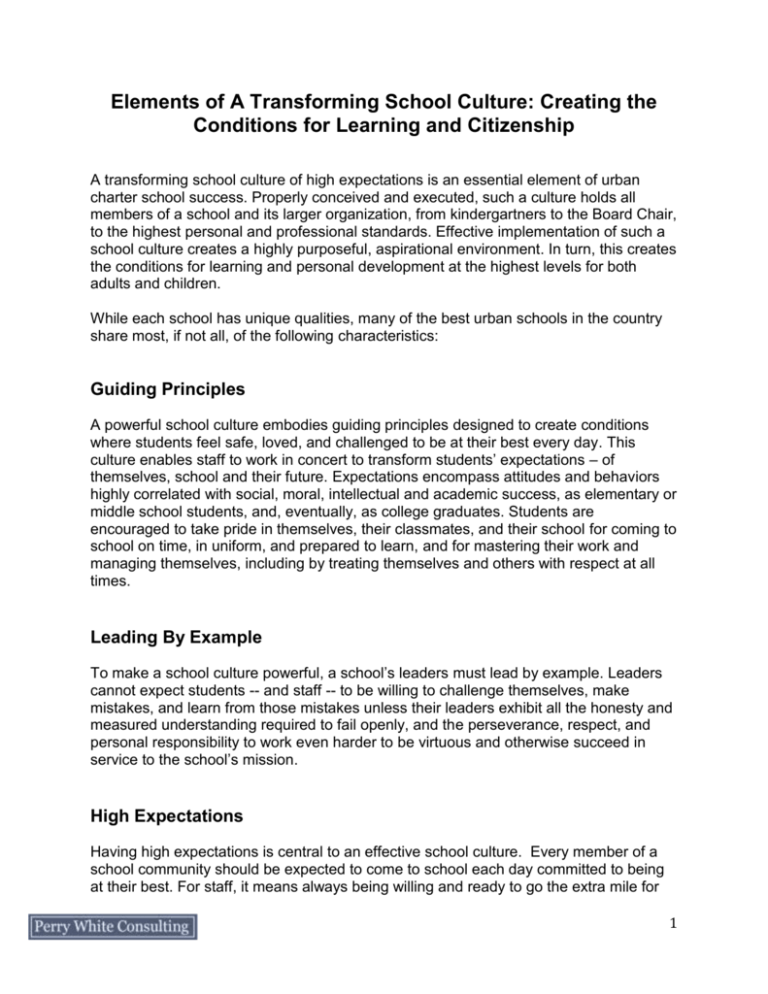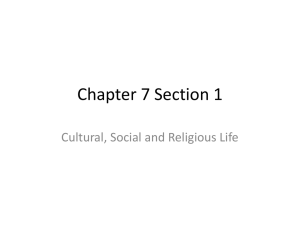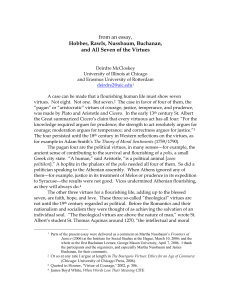Strong School Culture: What are the Steps to Building It?
advertisement

Elements of A Transforming School Culture: Creating the Conditions for Learning and Citizenship A transforming school culture of high expectations is an essential element of urban charter school success. Properly conceived and executed, such a culture holds all members of a school and its larger organization, from kindergartners to the Board Chair, to the highest personal and professional standards. Effective implementation of such a school culture creates a highly purposeful, aspirational environment. In turn, this creates the conditions for learning and personal development at the highest levels for both adults and children. While each school has unique qualities, many of the best urban schools in the country share most, if not all, of the following characteristics: Guiding Principles A powerful school culture embodies guiding principles designed to create conditions where students feel safe, loved, and challenged to be at their best every day. This culture enables staff to work in concert to transform students’ expectations – of themselves, school and their future. Expectations encompass attitudes and behaviors highly correlated with social, moral, intellectual and academic success, as elementary or middle school students, and, eventually, as college graduates. Students are encouraged to take pride in themselves, their classmates, and their school for coming to school on time, in uniform, and prepared to learn, and for mastering their work and managing themselves, including by treating themselves and others with respect at all times. Leading By Example To make a school culture powerful, a school’s leaders must lead by example. Leaders cannot expect students -- and staff -- to be willing to challenge themselves, make mistakes, and learn from those mistakes unless their leaders exhibit all the honesty and measured understanding required to fail openly, and the perseverance, respect, and personal responsibility to work even harder to be virtuous and otherwise succeed in service to the school’s mission. High Expectations Having high expectations is central to an effective school culture. Every member of a school community should be expected to come to school each day committed to being at their best. For staff, it means always being willing and ready to go the extra mile for 1 their students. For students, it means staff expect nothing less than their best, from their first day in the door until the day they graduate. "High expectations" does not mean that everything will always go perfectly, but it does mean that when something doesn’t, everyone will work together to address the issue to help ensure it doesn’t happen again. Students held to low expectations often meet, but rarely exceed, them. Students held to high expectations, especially in an encouraging environment, often meet and exceed them. Having high expectations tells students and staff that they can perform at the highest levels; holding them to those high expectations -- while supporting them along the way -- ensures they will become successful, engaged citizens. No Excuses An essential complement to a school’s high expectations for students is its “No Excuses” policy. Highly successful urban schools do not let their students or staff offer excuses for why something did not go properly. Instead, all are required to take ownership and responsibility for any failures or shortcomings, and work very hard -- with each other’s encouragement and assistance -- to improve. Frankly, in the absence of a no-excuses culture, schools, in effect, embody a “Give Me Your Best Excuse” policy. Inadvertently, the staff of such schools help students get better at making excuses than they are at helping students learn to become responsible citizens. The first excuse gives way to the second, and soon a school is full of students -- and sometimes staff -making excuses for shortcomings and failures. With the full implementation of a “No Excuses” policy, a school can effectively hold students and staff to the high expectations required of staff, students, and parents, alike, to best fulfill the mission of their school. Focus on College Preparation For students today to successfully compete and participate in our society, college graduation or its career preparation equivalent has become a prerequisite. Therefore, most highly effective urban charter schools’ missions and corresponding visions reflect this. Many urban charter schools’ missions and visions, also, call on their students to become productive and civically engaged citizens. From kindergarten on, a college preparatory focus is essential to realizing such schools’ mission and vision for their students. The goal of college graduation for each and every student reaffirms, in a consistent and uniform way, the high expectation that is held for all students: to become educated, virtuous, fair, honest, hard-working, civically engaged college graduates and responsible citizens. To help make this goal tangible, teachers often proudly hang banners from their alma maters, identify their grade’s students as the Class of (the year they are on track to graduate from college), have advisory groups named after colleges, actively discuss colleges, and go on field trips to local colleges and universities. This powerful focus on college is the pivot of transformational school cultures. 2 Virtues The best way to a good life is through making a habit of being virtuous. Successful schools recognize and embrace that there is more to a good education than a narrow track record of academic success. A strong, good character is just as important to becoming a responsible, fulfilled citizen as is mastering academics. Many exemplary urban schools’ Way, therefore, identify key virtues, such as -- courage, honesty, perseverance, responsibility, generosity, and respect. Conceptually, a school’s specific and selected virtues are continuously articulated in manifold ways. Behaviorally, everyone who is a part of such a school is expected to embody them on a daily basis. Virtues are an essential foundation of a school’s Way. Being exposed to and internalizing a school’s virtues affords students the courage and ability to respond to challenging situations and decisions constructively. However, for this to consistently occur, a deep appreciation and understanding of the virtues is required. But understanding is not enough. Practicing certain attitudes, thought processes, and behaviors until they become trusted habits lays the foundation for a strong character and consistently virtuous action. Central Importance of Relationships All learning and development takes place within relationships: relationships between adults, between students and adults, and between students. To create a platform on which to build trust and respect, it is important for students to feel safe, respected, and loved. Mutual respect and personal responsibility are paramount in building such relationships. Mutual respect among teachers and students is critical to developing the positive relationships required for effective teaching and learning. Taking personal responsibility for one’s own actions -- both positive and negative -- becomes much easier in a culture rooted in mutual respect. Without the most sincere and kind respect for the students -and the nurturing relationships which develop from that -- the ability to encourage and enforce a set of high-expectations remains very difficult. However, with positive and respectful relationships among staff and students, alike, staff are better able to understand and address the needs of their students; and, students are able to trust that the adults leading them truly have their best interests in mind. From public praises as part of morning announcements, to honoring Citizens of the Month, to classroom and school-wide community circles, and to lunches with school leaders, the school’s staff works hard every day to develop positive relationships with students built on mutual respect, high expectations, and appreciation. 3 Safety Safety is critical to establishing an effective school culture. Individually and collectively, staff must do everything reasonably possible to keep children and others safe. Some students when feeling unsafe need to test others; either to be reassured adults are in control, or alternately, to see if they, in fact, are in charge. This testing of adults in an environment perceived as unsafe tends to create additional anxiety among increasing numbers of students. Then to the extent that such testing is not met with clear, uniform rules consistently and effectively enforced, a self-perpetuating, downward spiral will develop; one that, invariably, leads to more anxiety and various forms of conflict. For all of these reasons, creating a consistently safe learning environment must be a staff’s first priority. It is an essential component of any school’s Way. Consistency and Uniformity Consistency and uniformity are principles essential to creating a powerful school culture. By “consistency” we refer to the lack of variation over time in the actions and statements of a teacher, other program staff, or the school, in general. “Uniformity” refers to the sameness or lack of variation across all staff and throughout the school. If each adult has a different opinion about what is right and important, then what is to prevent students from concluding, “If everyone has a different opinion, then why not go with yet another different opinion, my own?”. When all school staff are fully uniform and consistent in their statements and actions regarding expectations, rules, consequence, and the reasons for each element, then the chances of convincing each child that the adults know what they are doing and have the children’s best interests at heart are exponentially greater. Also, in addition to removing doubt, the consistency within each teacher’s realm and uniformity across all staff removes confusion and anxiety for children. No one benefits from the absence of uniformity and consistency. Sweat the Small Stuff As discussed above, being consistent and uniform is crucial. More generally, everything school leaders and staff say and do, including what they don’t say and don’t do, sends a message to students, families, and other staff. This is why it is so important to always “sweat the small stuff”, including by always being mindful of what messages you want to convey and what messages you are conveying. From strictly enforcing the dress code to picking up every little piece of paper on the ground, leaders and staff need to make sure every aspect of their school is presented in neat, clean, and professional ways. The message sent to students is clear: We take pride in our school and in ourselves, and so should you, because you are wonderful and you’re going places. Attention to detail is critical, and any slip up, however minor, if ignored, suggests that anything less 4 than our personal best is acceptable. When enforced in a loving environment, “sweating the small stuff” becomes a point of pride for everyone. The Power of Explanation By explanation, we mean thoughtfully and respectfully providing students with meaningful reasons for what school staff ask of them, and helping them appreciate how such things are -- or one day will be -- good for them and their classmates. By thoughtfully providing students with compelling honest reasons for everything staff insist they do, staff treat students with respect and dignity, and as rational individuals capable of thinking about what is in their real interests. In time, students come to believe the school’s Way is good for them. This greatly reduces the energy required of teachers to gain students’ heartfelt cooperation. Also, the persuasive arts help build the foundation for meaningful participation in a democratic society. Therefore, modeling them is essential to prepare students to become responsible, engaged citizens. Helping students understand the reasons for teachers’ expectations makes learning easier, reducing resistance to rules, new ideas, and challenges. Positive and Negative “Consequences” In a positive school culture, students are taught that every day they have the opportunity to make decisions governing their behavior, and that their choices have consequences - positive and negative. Generally, positive choices earn positive consequences and negative choices bear negative results. Students receive positive and negative consequences in fair, consistent, and nurturing ways to help them to learn. When done properly, the clarity ad consistency of these messages help students know that the adults in their school always support them and are willing to do whatever it takes to ensure they succeed. This component of a school’s Way helps lay a strong foundation for its students to succeed in their current school, future schools, including college, and beyond. Fairness Being fair, including not showing favoritism to any student or staff member, is essential. When leaders and staff are fair, consistent, and have others’ interests at heart, they can earn students’, families’, and staff members’ trust and respect. When fairness is practiced, staff are in are in a better position to insist on high expectations and personal consequences, while preventing excuse-making. Not being fair and consistent breeds distrust, which, in turn corrodes a school’s culture. Only with the fair and consistent embodiment of the school’s virtues, enforcement of its rules, and support for its students can a staff attain and maintain a powerful school culture. This document is based on one Perry wrote a few years ago about the school culture at Citizens Academy. 5









